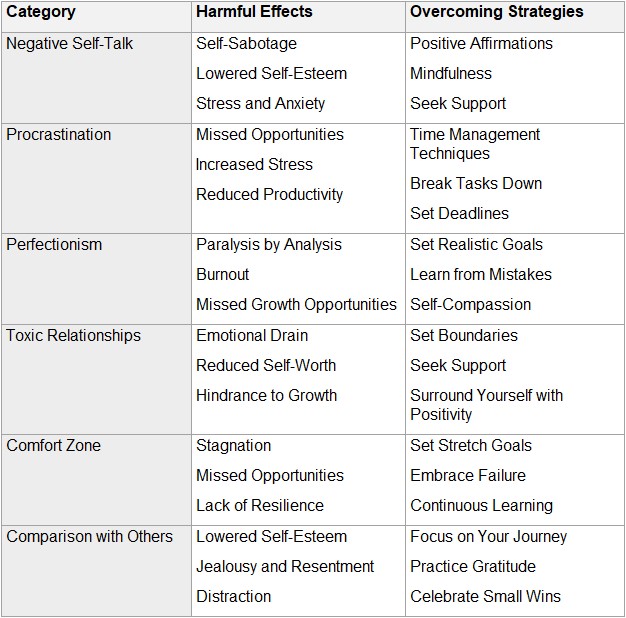6 Things to Stay Away from When Improving Your Life

Improving your life is noble, but requires a strategic approach to succeed. While much advice focuses on what to do, it is equally important to consider what to avoid. Certain habits and mindsets can hinder your progress, leading to frustration and stagnation. Here are six things to stay away from when improving your life.
1. Negative Self-Talk
Negative self-talk is a significant barrier to personal development. It involves internal dialogue in which you criticize yourself and doubt your abilities. This type of thinking can severely undermine your confidence and motivation.
Why It is Harmful
- Self-Sabotage: Constant negative thoughts can lead to self-sabotaging behaviors. For example, you might avoid new challenges because you fear failure. This can prevent you from seizing opportunities leading to growth and success.
- Lowered Self-Esteem: Negative self-talk erodes your self-esteem over time, making it harder to achieve your goals. You believe you are incapable or deserving of success, which can create a self-fulfilling prophecy where you do not put in the effort needed to succeed.
- Stress and Anxiety: Negative self-talk heightens stress and anxiety, harming mental health and overall well-being. Persistently doubting yourself and fixating on perceived flaws can create a stress and worry cycle that affects all aspects of life.
How to Overcome It
- Positive Affirmations: Swap negative thoughts with positive affirmations. For example, instead of thinking, “I cannot do this,” tell yourself, “I can achieve my goals.” Start your day with affirmations that reinforce your strengths and potential.
- Mindfulness: Practice mindfulness to realize negative thoughts and address them promptly. Techniques like meditation and deep breathing can keep you present and diminish negative thinking. When you notice negative self-talk, acknowledge it without judgment and gently redirect your thoughts to something positive.
- Seek Support: Therapy or counseling can provide strategies to combat negative self-talk. Talking to a mental health professional can help you develop healthier thinking patterns (Brown, 2010).
2. Procrastination
Procrastination is the habit of delaying tasks that need to be done. It can be a significant impediment to personal growth and productivity.
Why It is Harmful
- Missed Opportunities: Delaying actions can cause missed opportunities. You might miss essential chances for growth, learning, or advancement. Procrastination can cause you to miss deadlines, lose out on promotions, or fail cannot take advantage of time-sensitive opportunities.
- Increased Stress: Procrastination often leads to last-minute rushes, increasing stress and reducing the quality of work. This can make tasks more difficult and overwhelming, leading to a hard-to-break cycle of procrastination and anxiety.
- Reduced Productivity: Chronic procrastination hampers productivity and progress towards your goals. It can create a cycle of inefficiency and frustration, where you constantly feel behind and struggle to catch up.
How to Overcome It
- Time Management Techniques: Use tools like to-do lists, calendars, and time-blocking to manage tasks effectively. Prioritize your tasks and tackle them one at a time. Break your day into blocks dedicated to specific tasks and stick to the schedule.
- Break Tasks Down: Split enormous tasks into smaller, more manageable pieces. It becomes less intimidating and easier to start. Break down the larger task into smaller, achievable daily goals.
- Creating deadlines can instill a sense of urgency to complete tasks. Set realistic deadlines and stick to them. Use reminders and alarms to keep yourself on track and accountable (Clear, 2018).
3. Perfectionism
Perfectionism is setting unrealistic goals and being too harsh on yourself when you fall short. While striving for excellence is good, perfectionism can be detrimental.
Why It is Harmful
- Paralysis by Analysis: Perfectionists often get stuck in analysis, delaying action. You might overthink every detail and not take any action. This can lead to missed opportunities and unfinished projects.
- Burnout: Constant pressure to be perfect can cause burnout. You might exhaust yourself trying to meet impossible standards, leading to physical and mental fatigue.
- Missed Growth Opportunities: Fear of making mistakes can prevent you from taking risks essential for growth. You might avoid new experiences because you are afraid of not being perfect, which can limit your personal and professional development.
How to Overcome It
- Set Realistic Goals: Focus on progress instead of perfection. Focus on improving and learning rather than being flawless. Set achievable goals that challenge you but are within your reach.
- Learn from mistakes: See mistakes as chances to learn and grow. Every error is an opportunity to gain new insights and skills. Embrace a growth mindset that sees failure as a steppingstone to success (Dweck, 2006).
- Self-Compassion: Practice self-compassion by being kind to yourself even when things do not go perfectly. Show yourself the same compassion and forgiveness you would give a friend. Recognize your efforts and celebrate your achievements, no matter how small.
4. Toxic Relationships
Toxic relationships can sap your energy and harm your emotional well-being. You can find toxic relationships in any area of life, including family, friendships, and romantic relationships.
Why It is Harmful
- Emotional Drain: Toxic relationships are emotionally draining and can lead to stress and anxiety. These relationships often involve manipulation, criticism, and lack of support, leaving you feeling depleted and demoralized.
- Reduced Self-Worth: Being in a toxic relationship can diminish your self-worth and self-esteem. You might start to believe the negative things others say about you, which can affect your confidence and sense of self.
- Hindrance to Growth: These relationships often keep you from pursuing your goals and aspirations. Toxic people might discourage you from improving or taking new opportunities, keeping you in a negative cycle.
How to Overcome It
- Set Boundaries: Set clear boundaries to safeguard your emotional health. Determine what behaviors you will and will not tolerate and communicate these boundaries firmly. Be consistent in enforcing your boundaries and avoid being afraid to distance yourself from toxic individuals.
- Seek Support: Speaking with a therapist or counselor can assist you in managing and leaving toxic relationships. Professional support can provide strategies and emotional strength to help you make healthy changes (Seligman, 2011).
- Surround Yourself with Positivity: Foster relationships with people who support and encourage you. Spend time with those who uplift and inspire you, and distance yourself from those who bring negativity into your life.
5. Comfort Zone
While remaining in your comfort zone may feel secure, it prevents you from reaching your full potential. Growth happens when you step beyond your limits.
Why It is Harmful
- Stagnation: Staying in your comfort zone leads to stagnation and limits personal growth. You will not learn new skills or develop new perspectives if you only do what is familiar and comfortable.
- Missed Opportunities: Avoiding new experiences can cause missed opportunities for learning and development. You might pass up chances to advance your career or improve your life because you fear stepping out of your comfort zone.
- Lack of Resilience: You must develop resilience and adaptability by staying within your comfort zone. Facing challenges helps you become more robust and flexible, preparing you to handle future obstacles.
How to Overcome It
- Set Stretch Goals: Challenge yourself with goals that push you out of your comfort zone. Aim for objectives that require growing and learning, even if they initially seem daunting.
- Embrace Failure: View failures as learning experiences that contribute to growth. Each failure is a step towards success, providing valuable lessons that help you improve (Covey, 1989).
Continuous Learning: Continue to learn to grow your knowledge and skills. Take courses, read books, and seek new experiences that challenge and broaden your horizons.

6. Comparison with Others
Comparing yourself to others is a common habit but can harm your self-esteem and personal development.
Why It is Harmful
- Lowered Self-Esteem: Constant comparisons can make you feel inadequate. You might feel you could be more successful and happier than others, undermining your confidence and self-worth.
- Jealousy and Resentment: It can breed jealousy and resentment toward others. These negative emotions can damage relationships and well-being, creating a hard-to-break cycle of negativity.
- Distraction: Focusing on others’ achievements distracts you from your goals and progress. You need to catch up on your path and what you need to do to improve, which can hinder your personal growth.
How to Overcome It
- Focus on Your Journey: Focus on your growth and progress rather than comparing yourself to others. Everyone’s journey is unique, and focusing on your path and what you must do to achieve your goals is essential.
- Practice Gratitude: Cultivating gratitude for what you have can shift your focus away from comparisons. Recognize and appreciate your achievements and blessings and remind yourself of the positive aspects of your life (Gilbert, 2009).
- Celebrate Small Wins: Notice and celebrate your successes, even the small ones. This helps you see your progress and keeps you motivated. Celebrating small wins also helps you stay positive and focused on your journey rather than getting discouraged by comparing yourself to others.
Conclusion
Improving your life is a continuous process that involves adopting positive habits and mindsets while avoiding those that hinder progress. Avoiding negative self-talk can help you build a more fulfilling and successful life, as well as procrastination, perfectionism, toxic relationships, staying within your comfort zone, and comparing yourself to others. Remember, the journey to self-improvement is unique to each individual, and it is important to focus on your path and progress. Here is a recap of what to avoid:
- Negative Self-Talk: Recognize and replace negative thoughts with positive affirmations and seek professional support if needed (Brown, 2010).
- Procrastination: Use time management techniques, break tasks into smaller chunks, and set realistic deadlines to stay productive (Clear, 2018).
- Perfectionism: Set realistic goals, learn from mistakes, and practice self-compassion to avoid burnout and paralysis by analysis (Dweck, 2006).
- Toxic Relationships: Set clear boundaries, seek professional support, and foster positive relationships that encourage and uplift you (Seligman, 2011).
- Step out of your comfort zone by setting ambitious goals, learning from failure, and constantly seeking new knowledge to grow.
- Comparison with Others: Focus on your personal journey, practice gratitude, and celebrate your achievements to maintain a positive mindset (Gilbert, 2009).
Final Thoughts
Self-improvement is a journey that requires dedication, self-awareness, and a willingness to change. Recognizing and addressing the habits and mindsets that hold you back is important. By actively working to avoid negative self-talk, procrastination, perfectionism, toxic relationships, comfort zone complacency, and comparisons with others, you can pave the way for a more prosperous and fulfilling life. Embrace the process, be kind to yourself, and remember that every step you take toward improvement is a victory.
References
- Brown, B. (2010). The Gifts of Imperfection: Let Go of Who You Think You’re Supposed to Be and Embrace Who You Are. Hazelden Publishing.
- Clear, J. (2018). Atomic Habits: An Easy & Proven Way to Build Good Habits & Break Bad Ones. Avery.
- Covey, S. R. (1989). The 7 Habits of Highly Effective People: Powerful Lessons in Personal Change. Free Press.
- Dweck, C. S. (2006). Mindset: The New Psychology of Success. Random House.
- Gilbert, E. (2009). Eat, Pray, Love: One Woman’s Search for Everything Across Italy, India, and Indonesia. Penguin Books.
- Seligman, M. E. P. (2011). Flourish: A Visionary New Understanding of Happiness and Well-being. Free Press.
Thank you for being part of this community. The PKP Edge is reader-supported, and your $6/month subscription helps me deliver impactful content on personal growth and habits. Your support fuels my commitment to your success.